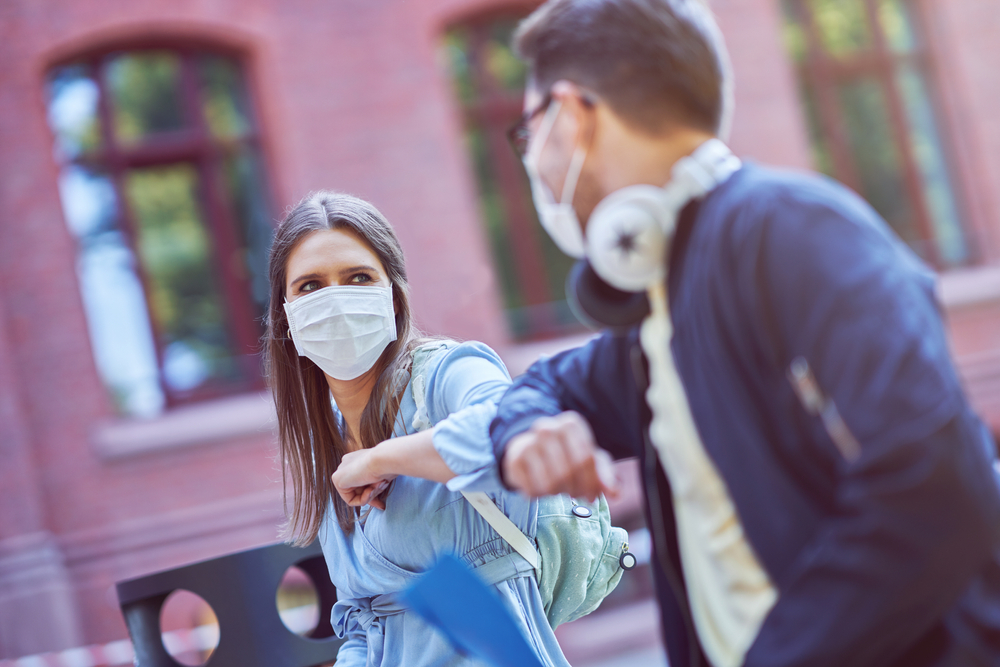On 21st September 2020, the Royal Irish Academy hosted an Online Conversation, Perspectives and Pathways in a Time of Crisis, which explored a safe return to campus and the issue of how to ensure the protection of our communities, students and staff, as we embark on a new academic year in a time of Covid.
The event was a shared initiative of the higher education community with support from THEA, IUA, HECA, USI, TUI, and Forsa working in conjunction with the RIA.
Introduced by Lorna Fitzpatrick, President USI, the conversation emphasised the work done to date by the sector, the safety of students/staff returning to campus, what can be done to facilitate this, and maintaining the quality and integrity of Higher Education. The speakers were Professor Philip Nolan, President Maynooth University & Chair of the NPHET Epidemiological Modelling Advisory Group, Professor Pete Lunn, ESRI, Minister Simon Harris, TD and Dr Lynn Ramsey, Chair, National Forum for the Enhancement of Teaching and Learning.
Work Done
The Minister for Further and Higher Education, Research, Innovation and Science, Simon Harris TD, made a point of thanking everyone in higher education “for stepping up” and providing Higher Education amid the pandemic. Stressing that education isn’t just transactional, the Minister praised the strength of the sector coming together collectively in the face of Covid-19 from March to September. He identified this moment as the start of another phase, which takes us from now, the start of a new academic year, to the end of the first semester. The focus now is on the return to college, the new academic year and trying to get to the safe conclusion of the first semester.
He pointed out that the No 1 priority is the safety of people, students, staff and communities. The minister also spoke about Text 50808, a free 24/7 anonymous text support service for people going through any mental health or emotional issues.
Safe Classrooms
Professor Nolan tackled the question of what conditions are considered safe for students in face to face teaching in terms of minimum distance. What is, and isn’t safe. He insisted that transmission would not be an issue in the classroom but more so in the closer social contacts over prolonged periods. Guidance from the Department of Further & Higher Education Research is very comprehensive and institutions have put in place the necessary health protection measures and are working closely with the Department. As long as these guidelines are appropriately implemented there should be little chance of transmissions. As it stands, students are advised to wear face coverings if they cannot maintain a distance of two metres during lectures. Nolan himself insisted that there would be no circumstance under which he would have to come within 2 metres of a student other than assisting in a lab setting, in which case he would expect both himself and the student to be wearing a face cover.
The clear message for campuses was avoiding crowding, being strict with hand sanitization and wearing face covering if you have any concerns about being too close.
Can not Can’t
Professor Lunn emphasised the need to understand behaviour and how to shape it and called for clear and easy-to-follow guidelines. For Lunn it is about encouraging behaviours that reduce the spread of COVID-19 and he drove the point home that the emphasis should be on what we can do rather than what we can’t. He talked about the challenge this year of ensuring that the college experience is real for students and highlighted the importance of the social experience. He made the point that while we can do whatever we can do to make indoor environments such as lecture theatres, libraries and labs, etc. as safe as possible, it is essential we don’t lose sight of the benefit of being outdoors. Colleges should encourage students to hold socially distanced events and congregations outside. Many college campuses provide some of the few outdoor spaces untroubled by traffic and busy streets. Professor Lunn encouraged these spaces to be cultivated to provide norms of gatherings to create spaces for social experience outdoors. He called on colleges to be imaginative about how they deal with restrictions and focus on opening up possibilities to allow for that social experience in college as well as education. As he said “you can’t get that social experience online.”
The 5 Cs
Finally, Dr Lynn Ramsey gave her reflections on the key contributions from the conversation and highlighted some of the work already underway in the sector. Pointing out how relationships are strengthened in crisis, she spoke about the benefits that accrue from the internal collaboration and partnerships forged during these testing times and how it can contribute to the new style of learning and maintaining the quality and integrity of Higher Education.
Ramsey spoke about the 5 Cs as we move towards this semester.
1.The need for Calm
2.The need for Courage
3.Strong Collaboration
4.The importance of Communication
5. The importance of wider Community and “leaving no student behind”.
Acknowledging the hard work that has been done to get us to where we are since the onset of Covid, Ramsey offered her watchwords as a beacon to help us move forward with what will be a difficult and demanding but ultimately a very innovative and rewarding semester.
The conversation focused on the positive and made it clear that the sector’s priority is students’ and staff’s well being and that of all the community and that there is all-round determination to provide a positive student experience while ensuring a safe and secure delivery of academic programmes.












Comments